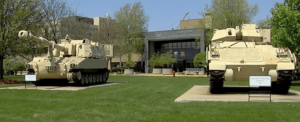An Arab American man from Melvindale is facing federal charges for attempting to carry out an armed attack on behalf of the terrorist organization ISIS against a military base in Warren on Tuesday. The arrest followed an undercover sting operation by two FBI agents that lasted nearly a year.
The U.S. Department of Justice announced the arrest of Ammar Abdulmajid-Mohamed Said, 19, a former member of the Michigan Army National Guard, as he was heading to target the U.S. Army’s Detroit Arsenal, known as TACOM (Tank-automotive and Armaments Command), located in Warren. Said reportedly launched a drone for reconnaissance purposes on Tuesday, May 13, the day he allegedly intended to execute the attack.
According to the federal criminal complaint filed in Detroit, Said planned to target the military facility after informing two undercover FBI agents of his intention to carry out a mass shooting inside the TACOM base. In April, he agreed to execute the attack under ISIS’ direction.
TACOM is full of targets. Jihad inside the U.S. would have a bigger impact than fighting abroad. – Said allegedly told undercover agents.
Said appeared in court Wednesday and the judge ordered him to remain in custody until his next court appearance for an evidence hearing on May 28. He faces charges of attempting to provide material support to a foreign terrorist organization, transmitting information related to destructive devices and providing armor-piercing ammunition and weapons magazines to the undercover agents. He also trained them in weapon usage and Molotov cocktail assembly and provided detailed information on how to infiltrate the base and identify the target building inside.
If convicted, Said faces up to 20 years in prison.
The charges and evidence
Court documents include sworn statements from the undercover agents revealing their secret communications with Said, who, over 11 months, believed them to be ISIS supporters. During this period, he shared his detailed plan to attack the TACOM base, including sending a drone last November to scout entry and exit points, facilities and equipment at the base.
It is also alleged that Said suggested to the agents that they store weapons in a commercial storage unit near the base. He discussed his proficiency with rifles due to his training in the Michigan National Guard, where he served for two years before being forcibly discharged in December for failing to meet entry requirements, according to a statement from the Michigan National Guard.
The arrest of this former soldier is a stark reminder of the importance of our counterintelligence efforts to identify and disrupt those who seek to harm our homeland. — Brigadier General Rhett Cox, Commander of U.S. Army Counterintelligence Command
At one point, Said became suspicious of the undercover agents, admitting that he placed an Apple AirTag in their vehicle to track their movements. However, his suspicions subsided, and he proceeded with the planned attack.
“The arrest of this former soldier is a stark reminder of the importance of our counterintelligence efforts to identify and disrupt those who seek to harm our homeland,” said Brigadier General Rhett Cox, commander of U.S. Army Counterintelligence Command.

U.S. Army’s Detroit Arsenal, known as TACOM (Tank-automotive and Armaments Command), located in Warren, Michigan.
The final chapter of the sting operation
At 10 a.m. on May 13, Said met an undercover FBI agent in a Dearborn park while wearing dark sunglasses. Together, they drove to a location near the TACOM base in Warren. There, Said launched a drone as part of his reconnaissance plan, only to be arrested minutes later, marking the conclusion of the nearly year-long undercover operation.
The case began last June when Said began communicating with an undercover federal agent posing as an ISIS supporter. In these conversations, Said expressed his desire to engage in what he called “violent jihad”, whether by traveling to ISIS-controlled territories abroad or by carrying out an attack inside the U.S.
In July, while serving as a National Guard soldier, Said boarded a military aircraft and was required to surrender his iPhone, allowing the FBI to obtain a court order to search the device. The search uncovered a Facebook message dated October 2023, sent to a person in the Palestinian territories, stating, “I want jihad.”
The phone examination also revealed Said’s membership in several Telegram channels containing ISIS flags and propaganda. Subsequently, the undercover agent introduced Said to another supposed associate — also an undercover federal agent — who claimed he could help him travel to ISIS territories. The three met in a secretly recorded meeting.
I am tired of this country… I swear to God, I want jihad. I want to fight among Muslims to raise the word of God, and my ultimate goal is martyrdom for the sake of God. – Said declared during a recorded conversation with undercover agents.
During the meeting, Said spoke passionately, saying “I am tired of this country… I swear to God, I want jihad. I want to fight among Muslims to raise the word of God, and my ultimate goal is martyrdom for the sake of God.” He detailed his intense military training in the National Guard, including handling weapons, throwing grenades and assembling and disassembling an AR-15 rifle while blindfolded.
The path to arrest
In late August, Said showed one of the agents a selfie video in which he pledged allegiance to ISIS. By October, he began discussing plans for an attack inside the U.S., proposing to target the TACOM facility, claiming to have visited the site during his military service and to have detailed knowledge of it.

The U.S. Army’s Detroit Arsenal, known as TACOM (Tank-automotive and Armaments Command), located in Warren.
As part of the attack preparations, Said told the undercover agents he had flown a drone over TACOM to scout entry points and targets. He also said he had visited gun and military supply stores, purchasing bottles and materials to make Molotov cocktails.
“TACOM is full of targets,” he said, adding that jihad inside the U.S. would have a bigger impact than fighting abroad, where one might kill “two, three, or four soldiers”, while outside the base “it’s just a dream.”
Said proposed entering the base through its main gate using his military ID or by cutting through the perimeter fence.
“If we can eliminate the first two soldiers at the entrance, that means two fewer soldiers to worry about,” he said, explaining that his motive for joining the National Guard was to obtain military training and learn how U.S. soldiers think.
“I wanted to be well-trained before I go anywhere… I am fully committed,” he said.
On May 8, preparations continued as Said delivered armor-piercing ammunition and other equipment to the agents. In a recorded conversation, he acknowledged that the operation might end with their deaths or arrests.
“It’s a military base,” he said. “I want you to know that. There’s no exit from it; it’s a one-way entry.”
Said, along with the agents, visited TACOM on November 15 to inspect its entrances. They then went to a rented storage unit, where Said launched a drone connected to his smartphone, which displayed a live video feed. He directed the drone toward the main gate, saying “There are the guards” and later practiced military tactics for entering the base. He also demonstrated how to prepare a Molotov cocktail, instructing, “Anything you see, shoot it.”
In December, Said expressed a desire to travel to Syria for jihad, but confirmed that he would continue to support the planned attack on TACOM if unable to travel. In one meeting, he recorded a video message in Arabic in front of an ISIS flag, reaffirming his allegiance and intention to carry on the plan — which ultimately ended with his arrest at a moment he believed to be the beginning of his mission.

Ammar Abdulmajid-Mohamed Said. Photo via federal complaint






Leave a Reply